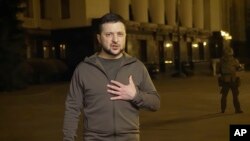U.S. President Joe Biden said Thursday NATO will bolster its defense capabilities after his Ukrainian counterpart, Volodymyr Zelenskyy, called on NATO leaders to provide more weaponry to his country “without limitations” as Russia’s invasion of Ukraine enters its second month.
Zelenskyy’s appeal came as Biden met with NATO leaders Thursday in Brussels to discuss their short- and long-term response to Russia’s month-old invasion of Ukraine, Biden’s first of three urgent meetings in Europe with world leaders.
Addressing the summit via video, Zelenskyy said his military needed fighter jets, tanks, improved air and sea defense systems, as he warned Russia would attack NATO members in Poland and in other eastern European countries.
“Russia has no intention of stopping in Ukraine,” he declared. "It wants to go further. Against eastern members of NATO. The Baltic states. Poland, for sure."
In a statement released by the White House, Biden said, “Between now and the NATO summit in June, we will develop plans for additional forces and capabilities to strengthen NATO’s defenses.”
A Biden administration official, who requested anonymity to discuss the closed NATO summit, told reporters that Zelenskyy did not reiterate his demand for a no-fly zone, which NATO previously rejected on the grounds it would lead to direct conflict between NATO and Russia.
NATO Secretary-General Jens Stoltenberg, who has said the alliance would not send warplanes or troops to Ukraine, acknowledged before the summit that NATO must reinforce its defenses and "respond to a new security reality in Europe."
After the summit, Stoltenberg said the alliance’s top military commander, General Tod D. Wolters, “has activated NATO’s chemical, biological, radiological and nuclear defense elements.”
"Allies are deploying additional chemical, biological and nuclear defenses to reinforce NATO’s existing and new battle groups," Stoltenberg added.
Biden administration officials have previously sounded the alarm that Moscow could use chemical weapons in Ukraine and blame the Ukrainians for their use as part of a false-flag operation to justify the Russian invasion. Biden also has previously warned that Russia would pay a severe price if it launched a chemical weapons attack but has not specified what that response would involve.
NATO members said in a joint statement after the summit they would “accelerate” their commitment to invest least 2% of their national budgets on the alliance, allowing for a significant strengthening of its “longer term deterrence and defense posture.”
The alliance also vowed to “further develop the full range of ready forces and capabilities necessary to maintain credible deterrence and defense.
In addition to the NATO talks, Biden is meeting Thursday with G-7 leaders and the European Council. National security adviser Jake Sullivan said the overall goal is to hear “the resolve and unity that we’ve seen for the past month will endure for as long as it takes.
Sullivan said that includes countries following through on commitments to supply military equipment to Ukraine, to enforce existing sanctions against Russia and to look for ways to augment both along with humanitarian aid for those affected by the fighting.
Meantime, Biden announced a new round of sanctions Thursday targeting 48 state-owned Russian defense companies and more than 400 Russian political figures, oligarchs and other entities.
Britain said Thursday its new package of sanctions included freezing the assets of Gazprombank, a main channel for oil and gas payments, as well as Alfa Bank, a top private lender in Russia. Oil tycoon Evgeny Shvidler, Sberbank CEO German Gref and Polina Kovaleva, stepdaughter of Russian Foreign Minister Sergey Lavrov were among individuals sanctioned.
China has criticized the sanctions imposed on Russia and has drawn warnings from Biden about not helping Russia to evade the measures.
Asked about China’s role, Stoltenberg said Thursday that China should “join the rest of the world in clearly condemning the Russian invasion of Ukraine and not provide political support neither provide any kind of material support to the Russian invasion of Ukraine.”
Stoltenberg told reporters the alliance is establishing four new battlegroups in the alliance’s eastern flank as part of its additional defensive measures since Russia’s invasion of Ukraine.
The combat-ready units are set to deploy to Bulgaria, Hungary, Romania and Slovakia, according to Stoltenberg, bringing the total number of NATO battlegroups on its eastern flank to eight. The other NATO battlegroups have been fully operational in the Baltic states and Poland since 2017.
U.S. Secretary of State Antony Blinken said Wednesday Russian forces have committed war crimes in Ukraine and that the United States will work to hold Russia accountable.
Russia has repeatedly rejected accusations of war crimes.
The United Nations says more than 3.6 million refugees, including 1.8 million children, have fled Ukraine since Russia launched its invasion one month ago. Another 6.5 million people have been displaced from their homes within the country. Among those displaced are 2.5 million children, the U.N. said.
National Security Correspondent Jeff Seldin and U.N. Correspondent Margaret Besheer contributed to this report.
Some information came from The Associated Press, Agence France-Presse and Reuters.







